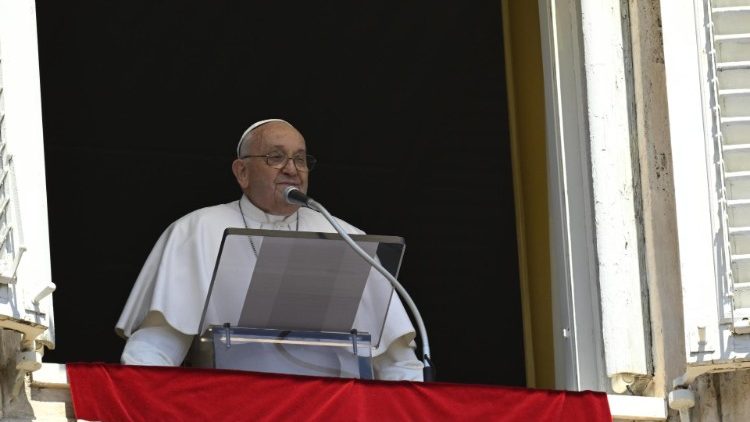Pope calls for repudiation of wars around the world
From the window of the Apostolic Palace, Pope Francis greets a local group of Emergency supporting Article 11 of the Italian Constitution. ‘Let war be banished, let issues be addressed through the rule of law and negotiation’. A prayer addressed to countries at war: ‘Let there be a halt to arms, let there be space for dialogue’. Recalling the tragedy in Valencia: ‘What can I do? Think about this question'.
Vatican City (AsiaNews) - This morning, after the recitation of the Marian Angelus prayer, from the window of the Apostolic Palace the Pope greeted the faithful gathered in a sunny St Peter's Square, especially those Italians from many cities.
The greeting dedicated to the Carmelite Missionary Sisters of the Holy Spirit, who are celebrating 25 years of their secular fraternity, and several local groups, was followed by that to the Roma Sud group of the organisation Emergency, founded by the Italian doctor Gino Strada in 1994.
The Rome group was in the square with the banner of the ‘R1pud1a’ campaign, which aims to create a community that focuses on the repudiation of war, a principle affirmed in Article 11 of the Italian Constitution.
‘May this principle be implemented throughout the world,’ the Pope said after reading a passage: “Italy repudiates war as an instrument of offence to the freedom of other peoples and as a means of resolving international controversies”.
This was immediatley followed by an invitation: ‘Remember this article, come on!’. An encouragement addressed to the NGO founded in Milan, which is committed to the defence of peace and to offering free and quality care to victims of war and poverty. Over the years it has intervened in 20 countries, building hospitals, surgical centres, rehabilitation centres, paediatric centres, first aid posts, health centres, and other intervention structures. ‘Let war be banished, and let issues be addressed with law and negotiation,’ the Holy Father added. Let arms be silenced, let space be given to dialogue. Let us pray for the tormented Ukraine, Palestine, Israel, Myanmar, South Sudan'.
Then, he dedicated a thought to the tragedy of the flooding in Valencia, Spain, of the past few days, which caused the death of at least 214 people, over 1,000 missing. The death toll is set to rise, with reconnaissance and rescue operations in the underground car park of the Bonaire shopping centre completely under water, with a capacity of 5700 cars. ‘We continue to pray for Valencia. And other peoples of Spain who are suffering so much these days. What can I do for the people of Valencia? Do I pray? Do I offer something? Think about this question,’ the Bishop of Rome said at the Angelus.
Before the prayer, Pope Francis commented on the Gospel of the day (Mk 12:28b-34), in which it is narrated that one of the scribes, approaching Jesus in the temple, asked him: ‘Which is the first of all the commandments?’. Jesus replies by holding together ‘two fundamental words of the Mosaic law’: ‘You shall love the Lord your God’ and ‘you shall love your neighbour’ (vv. 30-31). The scribe's request indicates the search for a ‘principle that underlies all’.
‘This question is also essential for us, for our lives and for the journey of our faith. We too, in fact, sometimes feel dispersed in so many things,' he said. A confusion that leads one to ask what are the most important things of all: ‘Where can I find the centre of my life, of my faith? Jesus gives us the answer,’ he added.
Hence the need to ‘return to the heart of life and of faith’, because it is precisely the heart ‘the source and the root of all other forces, of all other convictions’, Francis said, taking up the words of the last encyclical letter ‘Dilexit nos’, released on 24 October 2024. ‘Jesus tells us that the source of everything is love, that we must never separate God from man’.
He added that there are many ways to go in this direction, but the important thing is not to do them ‘only for ourselves and without love’, or ‘with a distracted heart or with a closed heart’, but ‘with love’. Because when the Lord comes ‘he will ask first of all about love’.
In conclusion, Francis said: ‘It is important then to fix in the heart the most important commandment - love the Lord your God and love your neighbour as yourself - and every day to make our examination of conscience and ask ourselves: is love for God and neighbour the centre of my life?’







.png)










